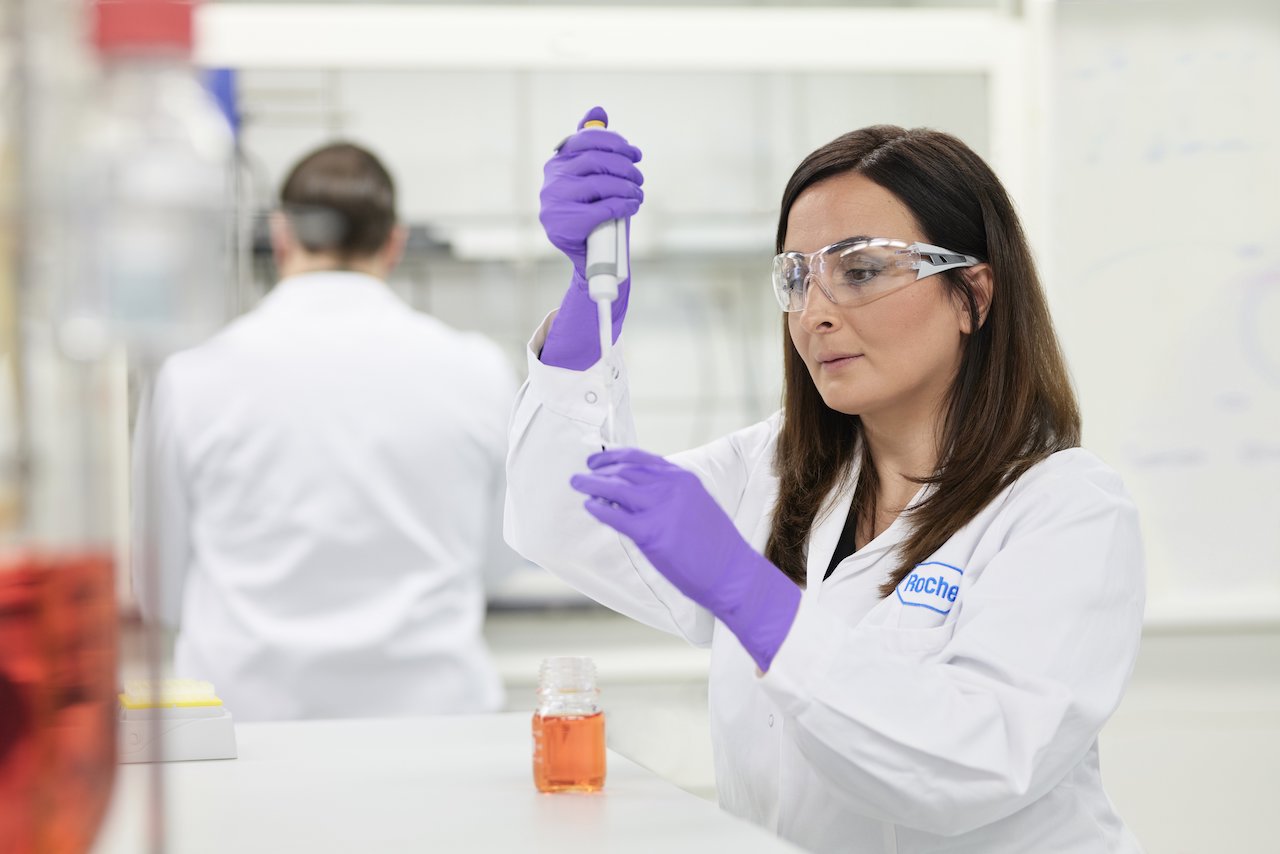*Interview with Aleksandra Ivanovska, General Manager, North Macedonia & Kosovo Roche Macedonia
At Roche, ambition lies not only in transforming healthcare, but also in their contributions to environmental protection, supply chain sustainability, social commitment, and philanthropy. Their corporate governance principles focus on sustainable value creation and prescribe a culture that recognizes standards of good corporate governance and policy of transparent communication. The governance structure embraces a decentralized model, empowering employees to integrate sustainability into their roles. Roche’s multifaceted approach intertwines ethical governance, transparent reporting, and a commitment to innovation, embodying its overarching goal of improving lives and advancing medical knowledge on a global scale.
1. Can you provide an overview of Roche’s ESG strategy and how it aligns with the company’s long-term vision and commitment to sustainable business practices? What does ESG mean to you and how does your ESG strategy operate in practice?
Our purpose is to do now what patients need next. How we identify and meet those needs − what we do every day − must be sustainable if we are to succeed. It is why sustainability is built into our business strategy and part of everyone’s job at Roche. Our approach is holistic and integrates the three dimensions of sustainability:
- Society: how we contribute to a better tomorrow for everyone
- Environment: how we minimize our impact on nature
- Economy: how we invest in medical advances, create jobs, and ensure livelihoods
We at Roche Macedonia focus on implementing sustainability initiatives in order to reduce our carbon footprint, improve working conditions for employees and prioritize diversity and inclusion in hiring and promotion practices.
We believe that innovative solutions are essential to achieving our sustainability goals and strive to create a workplace that encourages creativity and collaboration among local and global functions. Indeed, innovation requires an environment of collaboration and mutual trust where we know it is safe to bring all our knowledge and ideas to work and to challenge, think differently, and speak up. Creating this space is a shared responsibility requiring all of us to work side by side as advocates and allies.
At Roche, we are dedicated to creating long-term value for people by providing high-quality healthcare products and services that improve lives. We foster social stewardship and strive to operate in a responsible and sustainable manner that positively impacts the world around us. Our sourcing practices ensure that our products are made in a responsible and environmentally friendly manner. We respect and support the human rights of every person we reach and ensure they are rigorously embedded into every aspect of our business.
By fostering social stewardship, not only do we provide high-quality jobs and contribute to economic development, but we also listen to and engage with the communities in which we operate. Therefore, our effort to create sustainable social value goes beyond healthcare. We are dedicated to making a lasting impact by building stronger and healthier communities.



2. How do you monitor and measure the implementation of ESG components and compile the reports? What practices, policies, benefits, protection, and activities do you have in place to ensure positive and fair relations and practices with employees for their safety and prevention?
Our reporting follows the GRI, UN Global Compact and European Chemical Industry Council’s Responsible Care Reporting Guidelines. We track our performance against key financial and non-financial indicators, these are grouped under our main areas of engagement: social, environmental, and economic impact. Our staff bonus scheme is linked to our sustainability performance. Our Annual Report includes our non-financial performance. Roche has been ranked as one of the top three most sustainable healthcare companies in the Dow Jones Sustainability Indices for 14 years running, and in 10th place in the Access to Medicine 2022 Index, reflecting efforts to expand healthcare in low- to middle-income countries.
We are committed to promoting mutual respect, trust, and integrity. We believe each employee is entitled to fair, courteous, and dignified treatment during the hiring process, while employed, and at the end of employment. Roche takes appropriate measures to ensure protection of employees’ rights within the company.
For instance, we have a dedicated SHE (Safety, Health & Environment) officer that takes care of all main pillars connected to our employees’ health and wellbeing. This includes a yearly update of the Office Pandemic Plan, which ensures that we can support all our employees and their closest family members with protective gear, diagnostics/rapid tests and antivirals if another pandemic hits.
Furthermore, when choosing an office, we have very high standards in line with EU/Swiss regulations (HVAC system, light, air quality, entrance security etc.). We ensure everyone understands the risks and is provided with adequate instructions, training, and appropriate protective equipment. We consult our employees and encourage them to speak up when they have safety, welfare, or health concerns.
Furthermore, Roche takes care to ensure that the behavior of its business partners complies with applicable laws, regulations, industry codes and contractual terms, as well as with generally accepted sustainability standards, such as the protection of human rights, safety and environment, prohibition of child or forced labor, and anti-corruption. The company expects its business partners to respect the confidentiality of Roche’s data, information and especially trade secrets, and to take appropriate measures to maintain confidentiality and to protect against disclosure and misappropriation.
Working conditions for partners and collaborators along the supply chain are an important aspect of ESG. Companies may implement policies and practices to promote safe and fair working conditions for all workers, including those in the supply chain. To manage relationships with the local community, we engage in community outreach programs and initiatives that promote social good. This can include supporting local businesses, donating to local charities, and participating in community development projects.
Effective management of relationships with supply chain partners and local communities requires ongoing engagement and communication. We conduct regular assessments to identify risks and opportunities related to their operations and supply chain, and work to address any identified concerns. By prioritizing social and environmental responsibility in their operations and relationships with stakeholders, we can build trust and create long-term value for all stakeholders involved.
3. How is corporate governance integrated into Roche’s overall ESG strategy and how does this integration influence decision-making across various business areas? Could you provide an overview of Roche’s governance structure and how it facilitates the coordination and implementation of sustainability initiatives throughout the company?
To reach our environmental, social and governance goals, we need broad stakeholder engagement. No single department is responsible for managing sustainability, but all employees are encouraged to embed sustainability into their work.
As sustainability is built into our business strategy, a strong commitment from all business areas and senior management is reflected in our sustainability governance structure:
- The Corporate Governance and Sustainability Committee of the Board of Directors (BoD) is responsible and accountable for governing sustainability at the Board of Directors level. It supervises and provides advice on the sustainability strategy.
- The Corporate Executive Committee (CEC) is responsible and accountable for the overall strategy of Roche. It has delegated the responsibility for establishing, managing, and coordinating the implementation of the sustainability strategy to the Corporate Sustainability Steering Committee and appoints its members.
- The Corporate Sustainability Steering Committee sets the sustainability strategy and monitors its implementation.
- The Corporate Sustainability Operations Committee is responsible for implementing and advancing our sustainability agenda and reporting on the objectives and progress towards these objectives across all relevant global and affiliate functions that make up our global sustainability network.
- The Global Sustainability Network contributes to the sustainability agenda and delivers on the objectives in cross-functional and cross-divisional working groups.
In recent years, Roche has undergone a big internal transformation, moving from a traditional hierarchy-based, decision-making organization towards a flatter organization with a decentralized model. This means that each employee is empowered to take initiative and make decisions, and to take responsibility. In this new model, sustainability is implemented locally, answering local needs, and meeting local expectations, and is the responsibility of local management teams. Ultimately, sustainability is part of everyone’s job at Roche.
Our approach to sustainability is incorporated in the internal rules and procedures. As one of the world’s largest healthcare companies, Roche takes its obligation to meet the highest standards of business ethics and integrity very seriously. Meeting those standards is the responsibility of every employee. Our standards of business integrity are set forth in our Code of Conduct, which includes Corporate Principles. To further promote and support a shared understanding, Roche has implemented numerous policies, directives, position statements and guidelines that apply across the Group.
For instance, all employees working with government officials are expected to act in a legal and transparent way, complying with all applicable laws and regulations, as well as with the standards set out in our Good Practice Guidelines on Working with Government Officials. These Guidelines articulate a comprehensive framework that outlines the foundational principles for fostering proactive, honest, transparent, responsible, and sustainable dialogue and engagement between government officials and the private sector. Recognizing that the interplay between the public sector and the corporate sector is important for advancing the regulatory framework, the principles emphasize ethical conduct, transparency, and respect for independence. Prohibiting bribery and improper influence, the Guidelines stress accurate representation, proper reporting of contributions, and conditional acceptance of symbolic gifts in compliance with laws and local customs.

